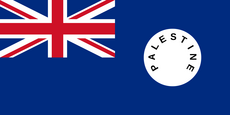| UN Security Council Resolution 43 | ||
|---|---|---|
 Palestine flag | ||
| Date | April 1 1948 | |
| Meeting no. | 277 | |
| Code | S/714, I (Document) | |
| Subject | The Palestine question | |
Voting summary |
| |
| Result | Adopted | |
| Security Council composition | ||
Permanent members | ||
Non-permanent members | ||
| ||
United Nations Security Council Resolution 43, adopted unanimously on April 1, 1948, notes the increasing violence and disorder in Palestine, calling upon the Jewish Agency for Palestine and the Arab Higher Committee to make representatives available to the Security Council to arrange and enforce a truce. The Resolution further calls upon armed Arab and Jewish groups to cease acts of violence immediately.